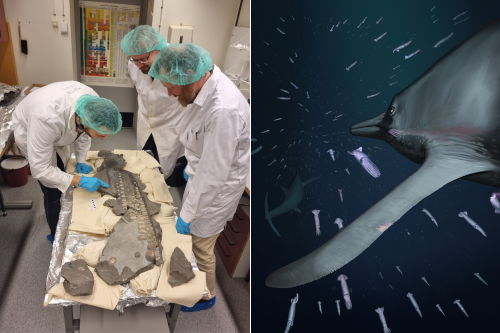News and features
UK’s most powerful supercomputer launches in Bristol
17 July 2025
Faster, more accurate cancer diagnoses and new clean-energy innovations are some of the key breakthroughs now closer to reality as the UK’s most powerful AI supercomputer launches in Bristol today [Thursday 17 July].
- Bristol professor elected as Fellow of the British Academy 18 July 2025 Professor Leon Tikly, Professor of Education at the University of Bristol, has been elected as a Fellow of the British Academy for his pioneering work addressing the global challenges of social, environmental and epistemic injustice.
- Popular historian and broadcaster receives honorary degree 18 July 2025 Historian, broadcaster, filmmaker and writer David Olusoga has received an honorary doctorate from the University of Bristol.
- UK’s most powerful supercomputer launches in Bristol 17 July 2025 Faster, more accurate cancer diagnoses and new clean-energy innovations are some of the key breakthroughs now closer to reality as the UK’s most powerful AI supercomputer launches in Bristol today [Thursday 17 July].
- Rainforest researchers find tropical butterflies that look alike, see alike 17 July 2025 Butterflies that independently evolved the same wing patterns have also evolved similar eyes and brains which are fine-tuned for vision in the shifting light of tropical rainforests, according to new research led by the University of Bristol published in PNAS this week.
- University experts team up with Team GB hockey Olympian to make school PE kits fitter for purpose and put ball in pupils’ court 17 July 2025 Top researchers have united with Team GB hockey player and sports inclusivity trailblazer Tess Howard MBE on a mission to help teenage girls feel more comfortable in their school PE uniforms – and own bodies – in a bid to boost self-confidence and sports participation.
- Ancient giant marine reptile relied on stealth while hunting in darkness 16 July 2025 A new study has uncovered evidence that a giant marine reptile from the Early Jurassic period used stealth to hunt its prey in deep or dark waters – much like owls on land today.
- Student overcomes severe spinal injury to graduate 16 July 2025 A student who suffered a serious spinal cord injury, leaving him with chronic pain that threatened not just his career but his daily life and passion for sports, has graduated from the University of Bristol with a first-class master’s degree in Biological Sciences.
- From graduation ceremony to epic charity bike ride 15 July 2025 A University of Bristol student who graduated last week with a first in Mechanical and Electrical Engineering is packing away his cap and gown to head to the Arctic Circle on Thursday to begin a mammoth 3,000 km cycle ride raising money for a school in Ghana, West Africa.
- Bio Detection dogs successfully detect Parkinson’s disease by odour, study finds 15 July 2025 People with Parkinson’s disease (PD) have an odour that can be reliably detected from skin swabs by trained dogs, a new study shows. The research, in collaboration with Medical Detection Dogs and the Universities of Bristol and Manchester, is published in The Journal of Parkinson’s Disease today [15 July].
- Student inventor of the world’s first automatic cable organiser graduates 14 July 2025 A student entrepreneur with a passion for invention has graduated with a degree in Mechanical Engineering from the University of Bristol after co-founding an award-winning startup that offers a smart solution to an everyday problem: tangled cables.










